UPDATED April 5th, 2022
It doesn’t matter if you travel alone or with your family, traveling is expensive. For us, we are always traveling with our kids so that is even more costly. For us, that is why it is so important to travel on a budget. But that can be hard to do. There are so many variables and things that can pop up. How can you prepare for all of it? Here are our travel tips on a budget.
Here are Our Tops Tips When Traveling on a Budget
1. Research your desired destinations
This is your number one weapon when trying to travel on a budget. Do all your research. This will help you to be able to determine a good budget and plan what activities you will want to do. The more knowledge you have about the costs and the destination, the easier it will be to stay on budget.
2. Create a realistic budget for your destination
Pulling a random number out of the sky is easy, but not at all realistic. There are two factors you need to consider when selecting the budget. The first is “What can you afford?” That one is personal. Look at your account, figure out what money will be coming in and going out and make an informed decision. The second is “Will this be enough to do the trip?” That part goes back to the research. Look up how much things cost where you are going so that you know whether or not the plan makes sense. Some areas have much higher costs than others.
3. Choose a destination that’s not a popular tourist spot.
This may seem odd but is a practical way to do things. It can go two ways. First, maybe the destination overall is off the beaten path. We have had the experience through my husband’s job to travel to a lot of places where you will find no tourists but tons to do. The other idea is staying NEAR a popular place but not in it. One example would be visiting somewhere like Cape May, NJ. If you stay in Cape May proper, you will pay a lot more money than if you stay in one of the smaller bay towns only 5-10 minutes away. When looking at rentals or hotels it is key to look at options just outside.
4. Book in advance
Many travel sites offer a deal for early booking. This is a good way to save money. Additionally, there are often deals for choosing nonrefundable options.
5. Book at the last minute
This one is not for everyone. However, if you are not particular about where you are staying, there are deals to be had for booking at the last minute. This can also be beneficial in some cases as there may be last-minute cancellations that vendors are looking to fill.
6. Compare prices for flights, rentals, etc.
This may seem obvious, but don’t just book your accommodations. Take the time to compare the prices and make sure you are getting the best deal. Also as you compare the prices, take notes of any additional charges and fees you might have to add on at the end to make sure the prices are a fair comparison.
7. Consider flying midweek instead of on Friday-Monday
Weekends are the most expensive flight times. If you can plan your trip in a way to avoid weekend flights, you can save yourself some serious money.
8. Travel overnight instead of during the day
This can apply to flying or driving. Overnight flights are generally cheaper. If you are traveling by car, overnight driving means that other than the driver, everyone else will more than likely be asleep. That means less stops and less chances to spend money.
9. Get travel insurance
This one may seem counterintuitive but it isn’t. It costs money to get travel insurance, however, if you get in a situation where plans need to be canceled or changed, that insurance helps you get your money back. Losing money invested in a vacation is not something you would want to do.
10. Off-Season travel
Of course it’s fun to visit places in peak season, but that is also when it is most expensive. You can save money in your budget by looking at times that are just outside of peak. This can also be fun because your destination will more than likely be less crowded. That means taking more in and seeing more.
11. Check out coupon websites
There are lots of sites that offer coupons or deals for traveling. Sites like groupon, retailmenot, and others make it easy to find deals that will help ease your budget while having a fun time. For theme parks, check the parks website as well as there are plenty of deals that are offered directly.
12. Use Points
This can apply to hotels, rentals, airlines, or even credit card points. But if you like to travel, try to choose places that allow you to accrue points so that later as you travel, you will have points to cash in. From our experience, we have been able to travel and use points for things such as free nights, rentals, and much more.
Pro-Tip: If you always attempt to stay at the same hotel chain and watch for bonus point opportunities you can stack up lots of free nights.
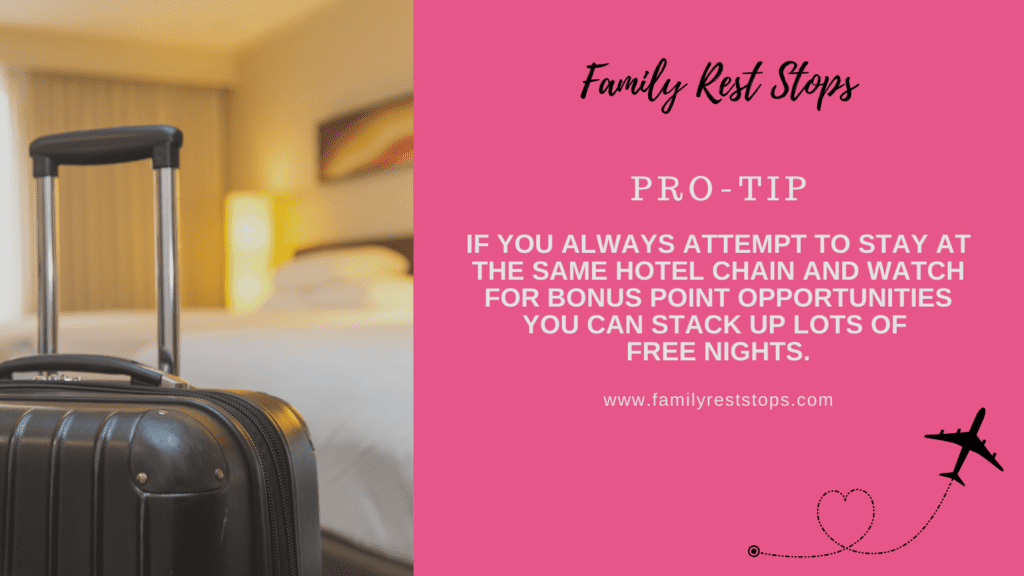
13. Determine your comfort level for sharing
This is another one that can go a few ways. Is there another family or friends you can travel with? Sharing costs across a group can mean cheaper accommodations. That also means you might be planning with a group, so you have to be prepared for that. Also if you are traveling overseas and are OK with sharing with strangers, hostels are a cheaper place to say. However, keep in mind that there is a lot of shared space and you have to be comfortable with that.
14. Don’t over pack
If you are flying, overweight bags are going to incur extra charges. Making sure you don’t over pack will help you avoid these. If you are driving, the heavier your bag the more it affects your fuel economy. It may not seem like a lot but it can add up in the end. Also, if you save room in your bags, that means a place to store any souvenirs or items you may purchase on your trip.
15. Don’t get stuck in all the tourist traps
These are easy to get caught up in. They are generally the most popular and most traveled places at your destination. That being said, these places also know they are the hot spots. Generally speaking they are going to be more expensive and geared toward making money.
16. Look at local websites and Visitor’s centers
This is similar to asking the locals. These centers and sites are basically the locals putting the information together for you before you ask. All the information on what you can do in an area and what might be fun can be found here.
Pro-Tip: Be aware that some of the things advertised here will be the tourist trap items. It is good to cross reference the information with other sources to make sure you are getting what you expect and at a good price.
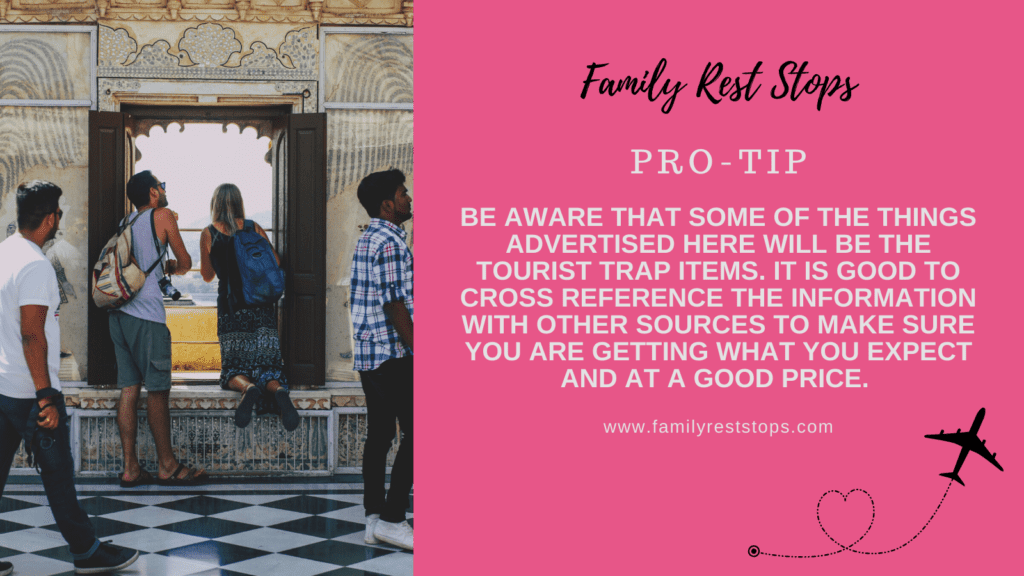
17. Ask the locals
The biggest experts for any area are usually the people who live there. They can often advise you on hidden gems or can warn you of places to avoid. They can also tell you what places are over priced or not worth the money.
18. Lookup free things to do in the area
Almost anywhere you travel to has things that are free to do and fun. Look for National Parks, open air markets, landmarks, and more that are available for you to enjoy. Finding free things to do isn’t just fun, it is budget friendly.
19. Be aware of fees (ATMs, tipping locals, etc.)
Unplanned fees can be a real budget buster if you are not prepared for them. Take the extra time to calculate things like tips and other fees and build them in your budget. Another thing to remember is to build a buffer into the budget for those things that might be unforeseen.
Pro-tip: Making sure you have a good idea of how much cash you need can help you avoid ATM fees. Just a little extra planning can end up ultimately saving you a lot of money.
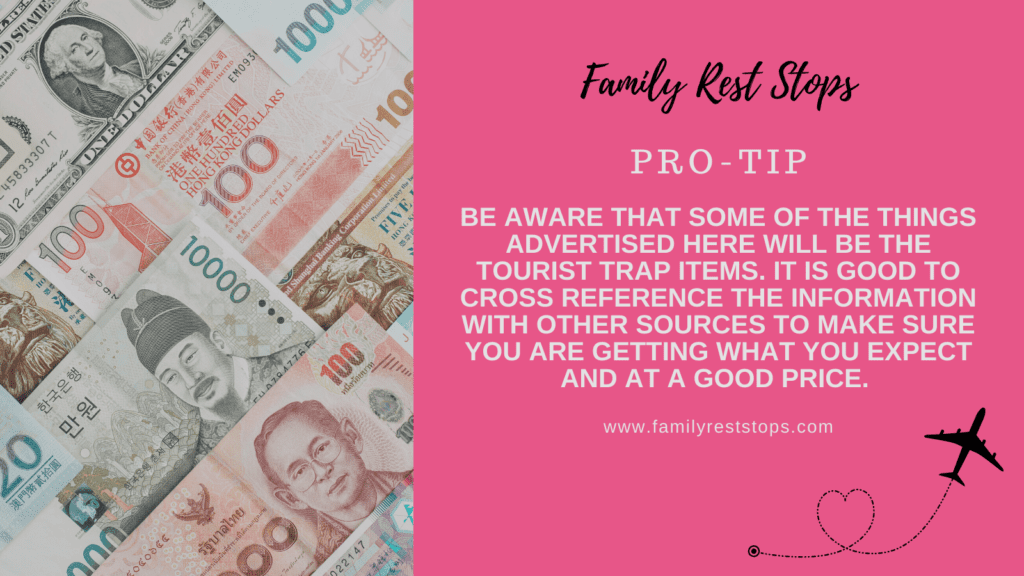
20. If traveling internationally, look into your phone plans
One thing people forget about is roaming charges. If you look into this prior to travel, many phone companies offer international travel plans with a flat rate upfront so that you can avoid roaming.
21. Read up on other Families’ experiences
With the age of the internet came blogs, social media, and YouTube. There are lots of families who love to share their experiences and through seeing their mistakes, you can avoid making those same mistakes. It also helps you plan your budget. Besides the obvious, it can also be extremely useful to look at reviews on sites like Yelp, etc.
Pro-Tip: Always take these reviews with a grain of salt, as your experience may be different. Ideally, look for posts that corroborate each other to confirm the information is valid.
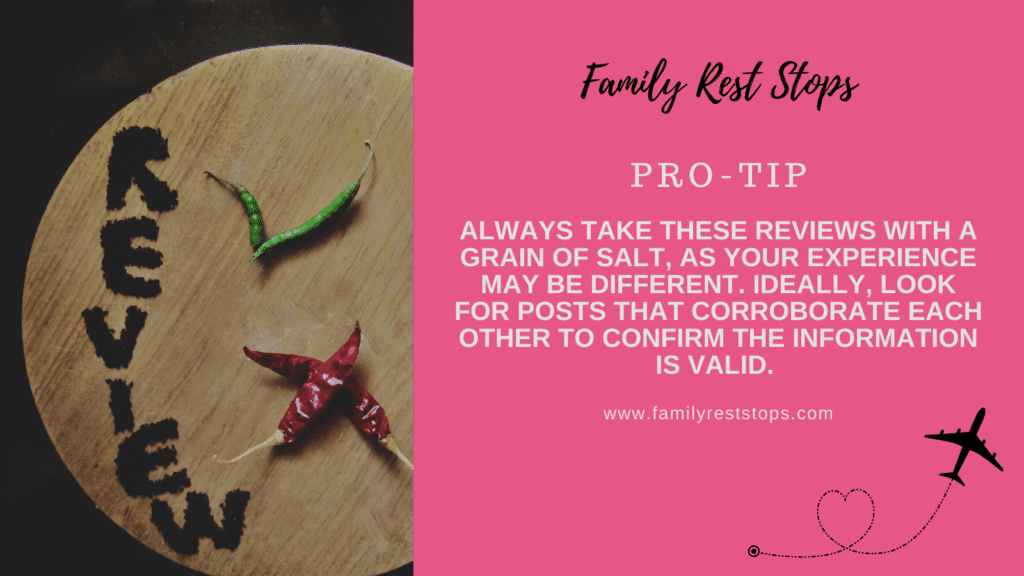
22. Look up a place to eat before you go (especially if you have small kids)
The idea behind this is twofold. If you look up the menu before you go you can confirm they have food that you and the kids will like. And since you are traveling on a budget, you can check the prices and make sure they fit your price point.
Pro-Tip: Make sure you check when the website was last updated. Many smaller, non-chain restaurants do not update their websites often and with the post-pandemic world and prices of goods being on the rise, the prices on the menu may be out of date. If it seems like the website has not been updated, call the restaurant to confirm the prices online are reflecting the current in-store prices.
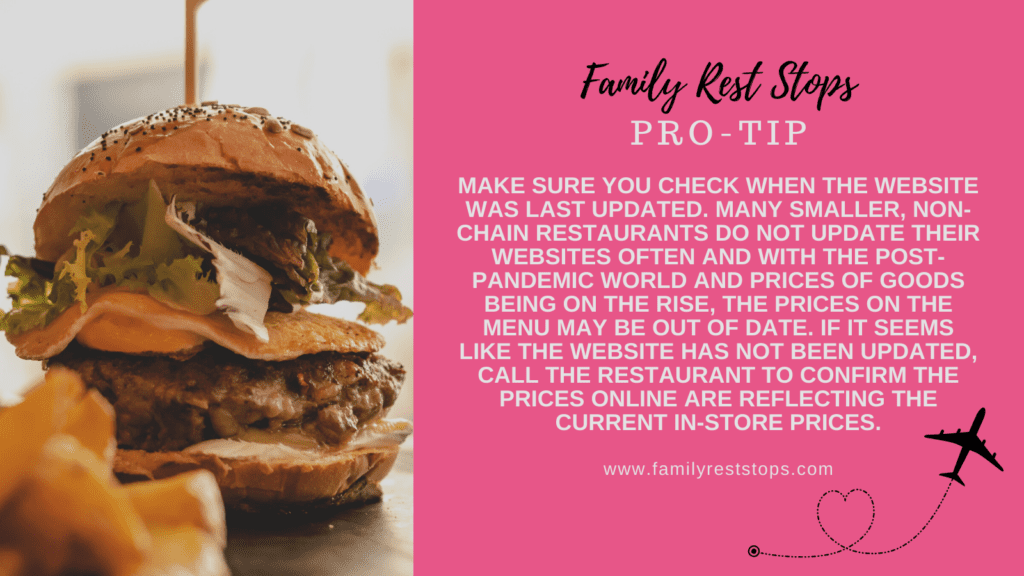
23. Eat the free hotel breakfast (if that’s where you chose to stay!)
Part of the booking and research stage includes checking out the hotel and the amenities. Making sure you get one with breakfast means that you can save some money on the morning food and coffee run,
Pro-Tip: Keep in mind that many hotels” breakfasts are not at the same level they were pre-pandemic. If the website is unclear about what is offered at the breakfast, make it a point to call the hotel and ask. You don’t want to arrive and find out they have a limited selection or have suspended breakfast completely.

24. Bring a reusable water bottle
Paying for water when you can get it for free in most places is just a bad idea whether you are traveling on a budget or not. The price of the bottles of water can be variable so this one tip for traveling on a budget could save you anywhere from a dollar or two a bottle to upwards of four dollars!
25. Consider packing lunches
This one can be tough but is also a great money saver. Packing lunches requires extra effort and isn’t the most fun thing to do, but saving money on a meal is sure fire way to travel on a budget.
26. Consider purchasing a City Visitor Pass
A City Pass is something that is available in many cities all over the US through a variety of vendors. These passes offer a flat rate admission to multiple attractions at a discounted rate. This may include places like zoos, museums, aquariums, and much more. Not only do they help you get these admissions at a lower rate, they help you identify some of the fun things to do in an area.
27. Plan ahead but still leave room for changes
While we generally have a strict budget when we travel, we try to remain fluid at the same time. No matter how much research you do, there will be things that you can not find online. That might mean unforeseen charges. It could also mean finding something that your family really wants to do but will cost unplanned money. We try to leave a little room in the budget for those little surprises.
28. Walk to as many places as you can
This doesn’t always seem like it will make an impact, but if you can cut down on the cost of gas used from driving everywhere, you will end up with extra money. In addition to walking, check out other inexpensive or free transportation options. For example, Disney offers buses at no additional charge. In Washington DC the metro is free for everyone as well.
29. Do your own excursions
Cruises and resorts often offer pre-planned excursions. While these are pretty convenient, they can also be rather pricey. Instead, take the time to plan out your own excursions. That way you can have all the fun but at a lower cost.
30. Visit national parks, museums, monuments, etc. (United States)
If Traveling in the US, National Parks are always free. There are also lots of free museums, national monuments and more that are paid for by the government and are no charge to you to explore. Make sure you search online before you go and see what might be around your destination.
Pro-Tip: There is a National Park “passport” that is available at all of the National Parks. Every park you go to will stamp it. This not only will tell you about all the parks in the country, but it also can make a great souvenir for the kids (or the kids at heart.)
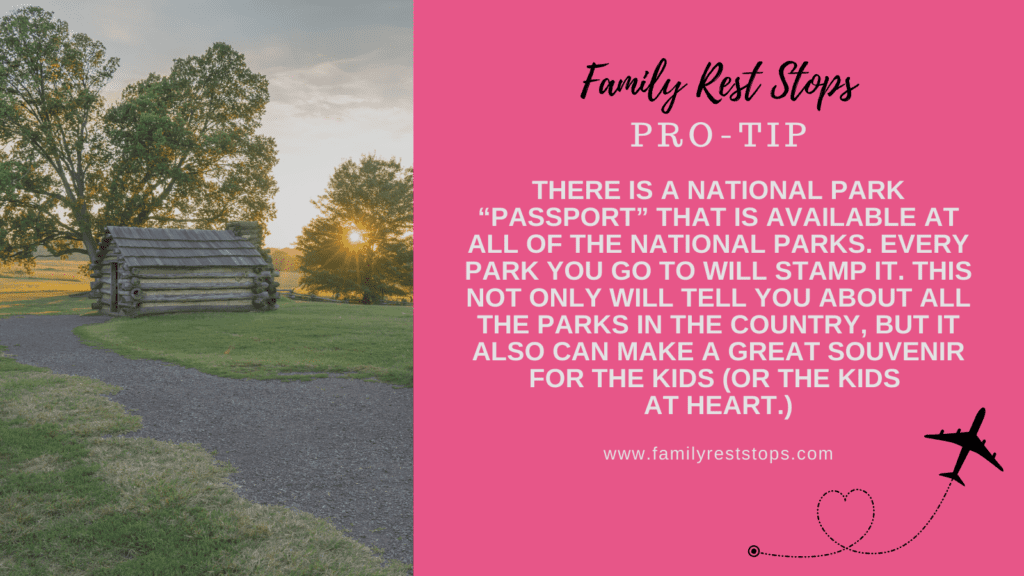
31. Be aware of local taxes
Every place you go the taxes may be different then your home. It is good to look online and find out what taxes you may be incurring on your trip. If there is a 6% sales tax for example, that means for every $100 you spend, there will be an additional $6 in tax. That can add up quickly and really throw the budget out of whack.
32. Don’t be afraid to haggle with locals
Many of your local stands are going to be willing to work with you to make money. This is especially true outside of the US. Most places want the money and will be willing to cut the price if that means that they can ultimately make a sale.
Pro-Tip: Don’t be afraid to walk away. Unless the item you are trying to purchase is extremely unique you can probably pick it up somewhere else or circle back if you have to have it and can’t find it elsewhere. Walking away though is a key negotiation tactic that will put pressure on the vendor to make the deal.
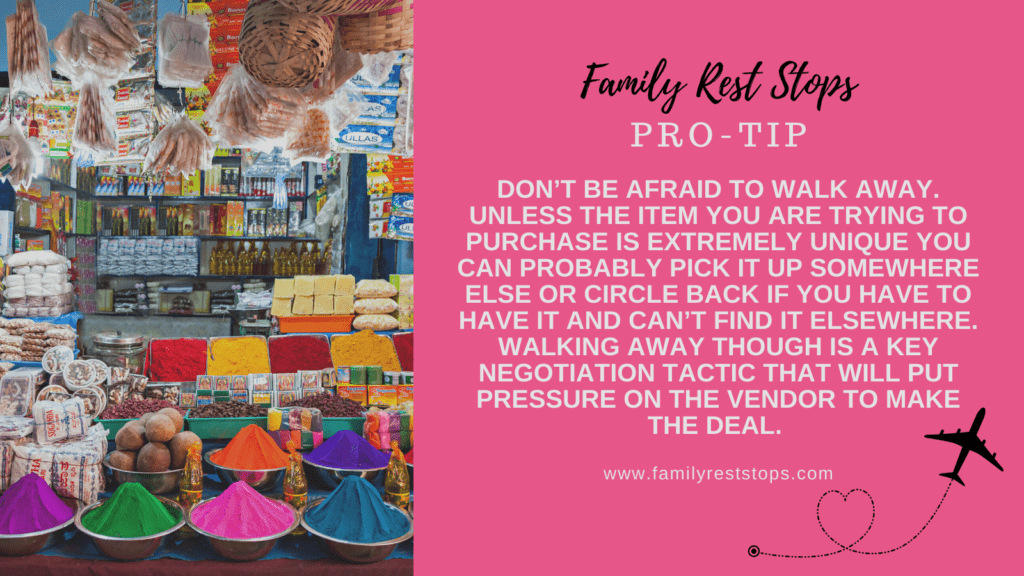
33. Don’t be afraid to be unorthodox
Thinking outside the box is a key tip for traveling on a budget. There are lots of things you can do that are unique or off the beaten path that will be less expensive. Think through options and do things that will work best for you and your family.
Our Final Thoughts
At the end of the day, traveling on a budget can be fun and easy to do. The theme though of most of these tips is planning and preparation. Making sure you plan and prepare before you travel is the ideal way to stay within budget. So get planning so you can get traveling, and above all else, have fun with it!
Check out destinations we’ve been to as a family!
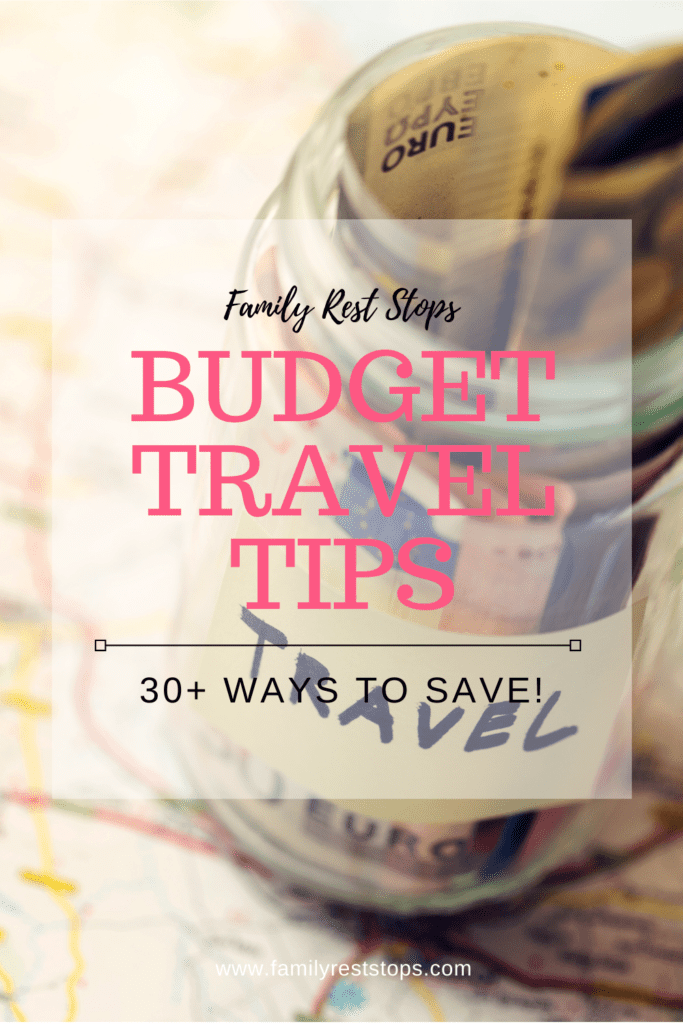

Pingback: Exploring and Working – Family Rest Stops
Thank you for sharing these 10 budget travel tips. I am always looking into ways to save during a trip. Great post!